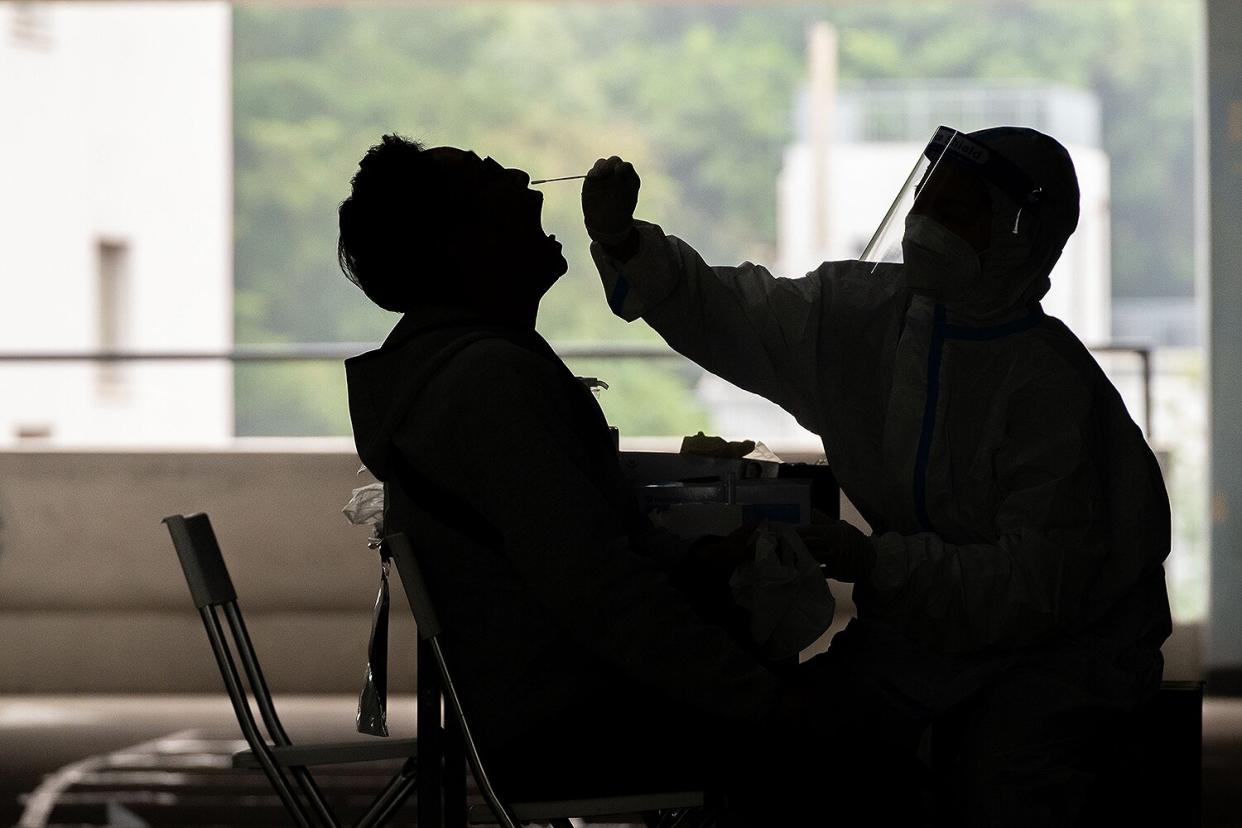What to Know About COVID Variant Omicron as WHO Warns It Could Be a 'Very High' Global Risk

Geovien So/SOPA Images/LightRocket via Getty COVID-19 testing
After health officials warned over the Thanksgiving holiday that a "worrying" new COVID-19 variant has been spotted in 16 countries around the globe, scientists and leaders have been scrambling to better understand Omicron, the latest mutation of the virus.
The variant, formally known as B.1.1.529, was first identified in Botswana on Nov. 25. Scientists in South Africa later determined that it had been spreading rapidly in both countries, and in the days since it has been spotted in travelers to Australia, Austria, Belgium, Britain, Canada, Czech Republic, Denmark, Germany, Israel, Italy, the Netherlands, Portugal, Spain and Hong Kong.
As more countries announce cases, the World Health Organization said Sunday that Omicron poses a "very high" risk globally, and that the "likelihood of potential further spread of Omicron at the global level is high."
RELATED: New COVID Variant Inspires CDC Meeting, Impacts European Travel: 'Most Worrying We've Seen'
"Depending on these characteristics, there could be future surges of COVID-19, which could have severe consequences, depending on a number of factors including where surges may take place," WHO said in a preliminary brief. "The overall global risk related to [Omicron] is assessed as very high."
WHO added, though, that "evidence for this assessment contains considerable uncertainty" and could change as they learn more.
Here's what is currently known about Omicron.
Is it more contagious?
It is not yet known if Omicron is more contagious than any previous variant, including Delta. The concern, though, is that Omicron carries around 50 mutations which have previously not been seen together in one strain of the virus. Based on those mutations, "you have to assume" that it could be the most contagious yet, Dr. Anthony Fauci, the top infectious disease expert in the U.S., said Saturday.
RELATED: Dr. Fauci 'Would Not Be Surprised' if Omicron COVID Variant Is Already in the United States
"We have not detected it yet [in the U.S.]," he said, "but when you have a virus that is showing this degree of transmissibility and you're already having travel-related cases that they've noted in Israel and Belgium and in other places — when you have a virus like this, it almost invariably is ultimately going to go essentially all over."
Scientists will have a better sense of Omicron's transmissibility in the next two weeks as they study the variant.
Does the vaccine work against it?
How well the COVID-19 vaccines work again Omicron also remains to be seen, but Pfizer and Moderna are already testing their formulations against the variant, and said they're prepared to create a booster shot that would work against it if needed.
Currently, it's difficult to judge if Omicron evades the vaccine, as most of South Africa — where it's spreading — is largely unvaccinated. As of Nov. 29, just 24.1% of the population is fully vaccinated.
RELATED VIDEO: Unvaccinated TikToker Who Died of COVID Spent Last Days Urging Followers to Get the Vaccine
Regardless, getting vaccinated remains the best protection against COVID-19. Even if current vaccines are less effective against Omicron, they can still make a difference. Fauci urges unvaccinated people to get their shots and for Americans to get a booster dose, if eligible.
RELATED: FDA Approves COVID Booster Shots for All Americans Age 18 and Up
"It is absolutely essential that unvaccinated people get vaccinated and the vaccinated people get boosters," Fauci said. "We know now clearly that when you get a booster shot ... you dramatically increase the level of protection [you have]."
What can people do now to stay safe?
The best protection is a COVID-19 vaccine or booster dose for those that need them, and as always, reducing contact with people outside of households and wearing a mask. But currently, more information on Omicron is needed, and President Joe Biden emphasized that the variant is a "cause for concern, not a cause for panic."
"We have the best vaccine in the world, the best medicines, the best scientists, and we're learning more every single day," he said Monday. "We'll fight this variant with scientific and knowledgeable actions and speed, not chaos and confusion."
As information about the coronavirus pandemic rapidly changes, PEOPLE is committed to providing the most recent data in our coverage. Some of the information in this story may have changed after publication. For the latest on COVID-19, readers are encouraged to use online resources from the CDC, WHO and local public health departments. PEOPLE has partnered with GoFundMe to raise money for the COVID-19 Relief Fund, a GoFundMe.org fundraiser to support everything from frontline responders to families in need, as well as organizations helping communities. For more information or to donate, click here.

 Yahoo Movies
Yahoo Movies 
